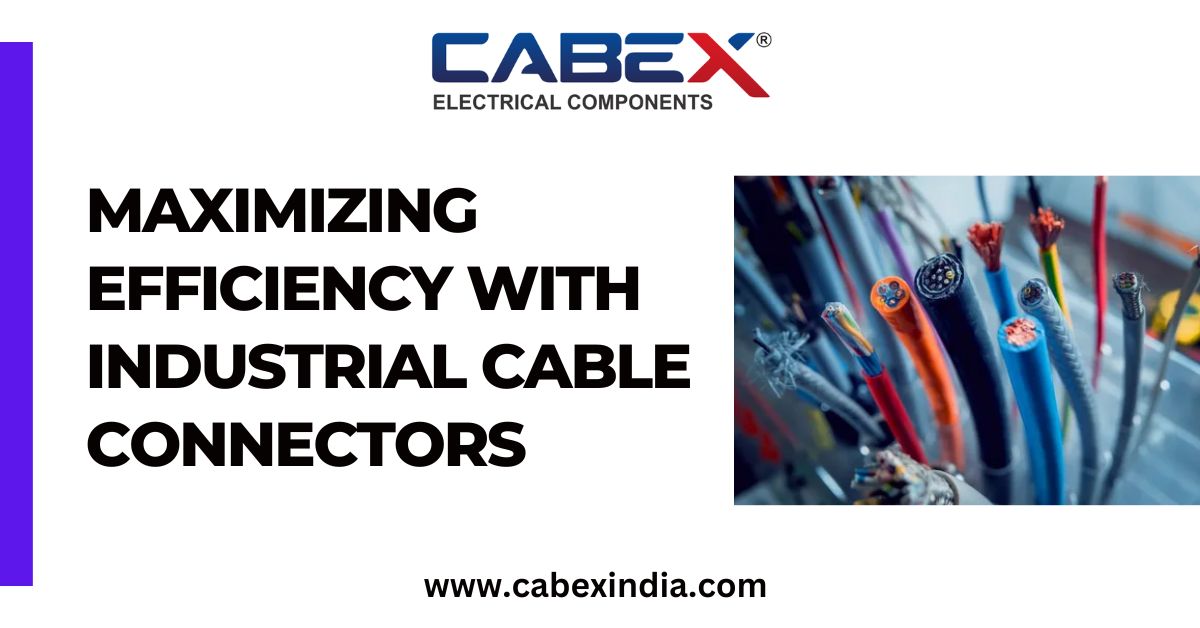Industrial Cable Connectors, In the heart of every smoothly functioning industrial operation lies a network of cables, carrying the lifeblood of data, power, and control signals. But these cables wouldn't be able to perform their vital role without the unsung heroes: industrial cable connectors. These specialized components ensure secure and reliable connections, keeping your machinery humming and your production lines running at peak efficiency.
This blog post, brought to you by CableX India (https://cabexindia.com/), your one-stop shop for all your industrial cable connector needs, dives deep into the world of these essential elements. We'll explore the different types, their functions, key considerations for choosing the right connector, and answer some frequently asked questions. Let's plug in!
Types of Industrial Cable Connectors
The diverse world of industrial settings demands a variety of connector types, each with its own unique strengths and applications. Here's a breakdown of some common categories:
- Rectangular Connectors: These workhorses of industrial automation boast rectangular housings and feature a modular design. They excel in applications like control systems, machinery, and industrial automation due to their versatility and ease of use.
- Circular Connectors: As the name suggests, these connectors sport a circular housing and are renowned for their robustness and reliability. They find favor in demanding environments like aerospace, military, and transportation, where resistance to harsh conditions and vibrations is paramount.
- Coaxial Connectors: These specialized connectors provide a shielded path for high-frequency radio signals. They are crucial for telecommunications, broadcasting, and medical equipment applications where signal integrity is critical.
- Ethernet Connectors: The backbone of modern industrial communication, Ethernet connectors enable high-speed data transmission within industrial Ethernet networks, connecting devices and facilitating seamless information flow.
- Power Connectors: Built to handle heavy-duty power delivery, these connectors come in various configurations to handle high voltage and current levels. They are commonly used in industrial machinery, power distribution systems, and renewable energy applications.
Functions and Applications
Industrial cable connectors aren't just about connecting wires; they play a vital role in ensuring efficient and reliable operation of various systems. Here are some key functions they perform:
- Power Transmission: Power connectors deliver electrical energy to machinery and equipment, keeping your production lines powered up.
- Signal Transmission: These connectors ensure the seamless flow of control signals between devices, allowing for proper operation and automation.
- Data Transmission: Ethernet connectors facilitate high-speed data transfer within industrial networks, enabling real-time monitoring and communication.
- Easy Maintenance and Repair: Quick-disconnect connectors allow for easy disassembly and reassembly of equipment, facilitating faster maintenance and repairs.
- Environmental Protection: Connectors often feature rugged housings and sealing mechanisms, protecting internal connections from dust, moisture, and other contaminants.
The applications of industrial cable connectors are vast and encompass nearly every industrial sector. Here's a glimpse:
- Industrial Automation: Connectors facilitate communication and power flow between robots, controllers, sensors, and actuators.
- Machine Tools: They ensure proper connectivity between motors, sensors, and control systems in CNC machines, lathes, and other manufacturing equipment.
- Renewable Energy: Power connectors are vital in wind turbines, solar panels, and other renewable energy applications, ensuring efficient power transmission.
- Oil & Gas: These connectors find use in drilling platforms, refineries, and other oil and gas applications, requiring robust construction for harsh environments.
- Transportation: Connectors play a vital role in aircraft, ships, and railway systems, connecting control systems and ensuring safe operation.
5 Frequently Asked Questions (FAQs) About Industrial Cable Connectors
1. How do I choose the right industrial cable connector?
Choosing the right connector involves considering several factors:
- Application: Understanding your specific application (power, data, signal) is crucial.
- Environmental Factors: Consider the operating environment (temperature, humidity, vibration).
- Cable Type and Gauge: Choose a connector compatible with your cable size and type.
- Number of Pins and Functionality: Determine the number of conductors and the functionality required.
- Ingress Protection (IP) Rating: Select a connector with an appropriate IP rating for your environment's dust and moisture levels.
2. What are some features to look for in a good industrial cable connector?
Look for features like:
- Durability: Robust construction for harsh environments.
- Corrosion Resistance: Especially important in areas with moisture or chemicals.
- Vibration Resistance: Crucial for applications with constant movement.
- Easy Assembly and Disassembly: Ensures quick connection and maintenance.
- Safety Features: Look for features like locking mechanisms to prevent accidental disconnection.
3. Are there any safety considerations when using industrial cable connectors?
Always follow these safety guidelines:
- Use connectors rated for the voltage and current you're
Conclusion
Industrial cable connectors are the unsung heroes of modern industrial operations, ensuring reliable and efficient connections between devices and systems. From power transmission and signal control to data communication and environmental protection, these connectors play a vital role in driving automation and productivity across various industries.





Comments